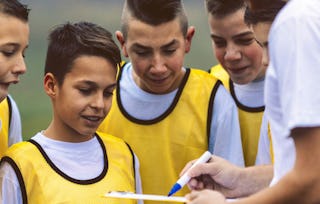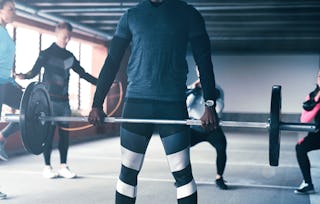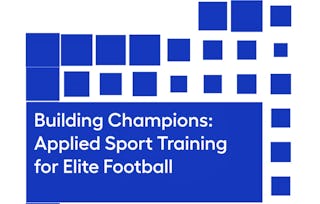In this course you will learn how to design the type of training that takes advantage of the plastic nature of the athlete’s body so you mold the right phenotype for a sport. We explore ways the muscular system can be designed to generate higher force and power and the type of training needed to mold the athlete's physical capacity so it meets the energy and biochemical demands of the sport.

Science of Training Young Athletes Part 2
3 days left! Gain next-level skills with Coursera Plus for $199 (regularly $399). Save now.

Science of Training Young Athletes Part 2

Instructor: Dr. Chris Brooks
9,419 already enrolled
Included with
(116 reviews)
Skills you'll gain
Details to know

Add to your LinkedIn profile
See how employees at top companies are mastering in-demand skills

There are 5 modules in this course
In the first topic you are introduced to the fundamentals of training science. This knowledge underlies your ability to design the type of training that will most effectively improve an athlete’s performance. Essential concepts such as homeostasis, core training principles, magnitude and timing of the training stimulus, and periodization theory are all discussed.
What's included
33 videos4 assignments1 discussion prompt
Training an athlete’s strength and power so it improves their sport performance is a challenging aspect of coaching. Here is the important knowledge you must have: First, you must understand the important terminology such as strength, torque, work and power. Second, you must be able to apply the principle of specificity and transfer of training effects to the athlete’s strength and power development. Third, you must know what peripheral structural adaptations and central adaptations you are trying to accomplish.
What's included
35 videos4 assignments1 discussion prompt
Fatigue is a phenomenon we all experience. It is characterized by tiredness and the desire to rest. Whether the athlete likes it or not, fatigue serves a protective function. It is both cognitive and physical in nature. In this topic you are introduced to the science of acute fatigue due to training and competition. With rest, acute fatigue dissipates and the body becomes stronger. You will learn about important fatigue theories, and the factors believed to contribute to fatigue such as low fuel supplies, acidity and body temperature.
What's included
33 videos4 assignments1 discussion prompt
When an athlete is underperforming, and you don’t know why, suspect chronic fatigue due to overtraining as the prime contributing factor. Unfortunately, because we don’t fully understand chronic fatigue our knowledge about overtraining remains scant. Hans Selye’s General Adaptation framework suggests it is likely due to too much training and insufficient recovery that leads to a prolonged maladaptation of physiological systems and structures. In this module you are provided insight into chronic fatigue and its relationship to overtraining.
What's included
43 videos5 assignments1 discussion prompt
The final topic examines how to organize an athlete’s training so it ensures peak performance. We begin by discussing how to manage the various training effects resulting from a training session. Then we explore methods you can use to quantify training loads and how to taper those loads before a major competition. Finally, you will learn about thinking behind assembling an annual training plan
What's included
20 videos3 assignments1 peer review1 discussion prompt
Instructor

Offered by
Explore more from Personal Development
 Status: Preview
Status: PreviewUniversity of Florida
 Status: Free Trial
Status: Free TrialNiel Asher Education
 Status: Free Trial
Status: Free TrialReal Madrid Graduate School Universidad Europea
 Status: Free Trial
Status: Free TrialNiel Asher Education
Why people choose Coursera for their career

Felipe M.

Jennifer J.

Larry W.

Chaitanya A.
Learner reviews
- 5 stars
93.96%
- 4 stars
5.17%
- 3 stars
0.86%
- 2 stars
0%
- 1 star
0%
Showing 3 of 116
Reviewed on Aug 10, 2020
Very in depth and absolutely brilliant content. This is essential for every coach or physical trainer.
Reviewed on Jan 26, 2021
Fantastic course. A must for anybody training athletes or young athletes. Looking forward to more such educational content. Thank you!
Reviewed on Mar 5, 2018
This course gives a basic understanding of how to train the athletes in a right approach without overlaoding and injury
Frequently asked questions
To access the course materials, assignments and to earn a Certificate, you will need to purchase the Certificate experience when you enroll in a course. You can try a Free Trial instead, or apply for Financial Aid. The course may offer 'Full Course, No Certificate' instead. This option lets you see all course materials, submit required assessments, and get a final grade. This also means that you will not be able to purchase a Certificate experience.
When you purchase a Certificate you get access to all course materials, including graded assignments. Upon completing the course, your electronic Certificate will be added to your Accomplishments page - from there, you can print your Certificate or add it to your LinkedIn profile.
Yes. In select learning programs, you can apply for financial aid or a scholarship if you can’t afford the enrollment fee. If fin aid or scholarship is available for your learning program selection, you’ll find a link to apply on the description page.
More questions
Financial aid available,
¹ Some assignments in this course are AI-graded. For these assignments, your data will be used in accordance with Coursera's Privacy Notice.





